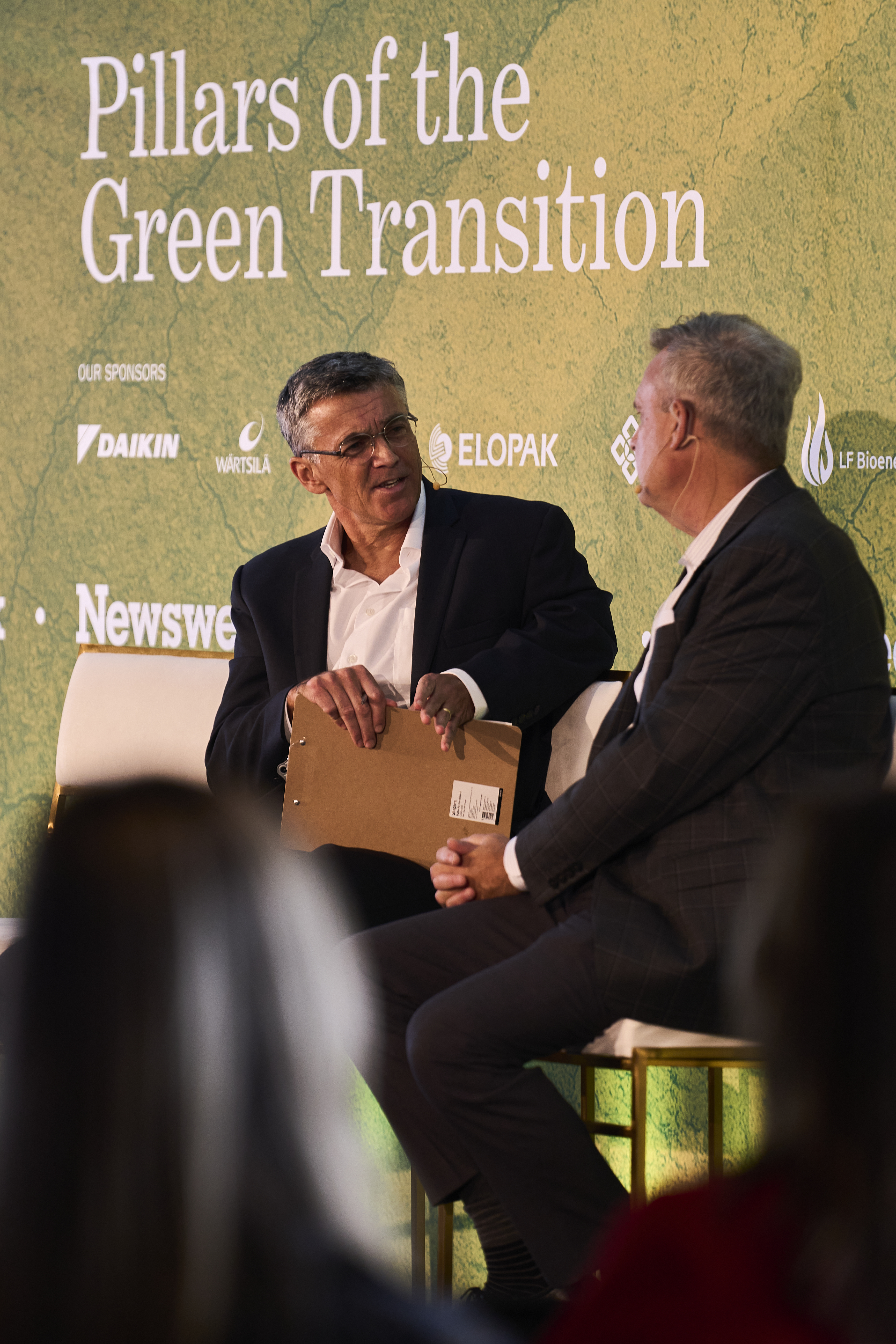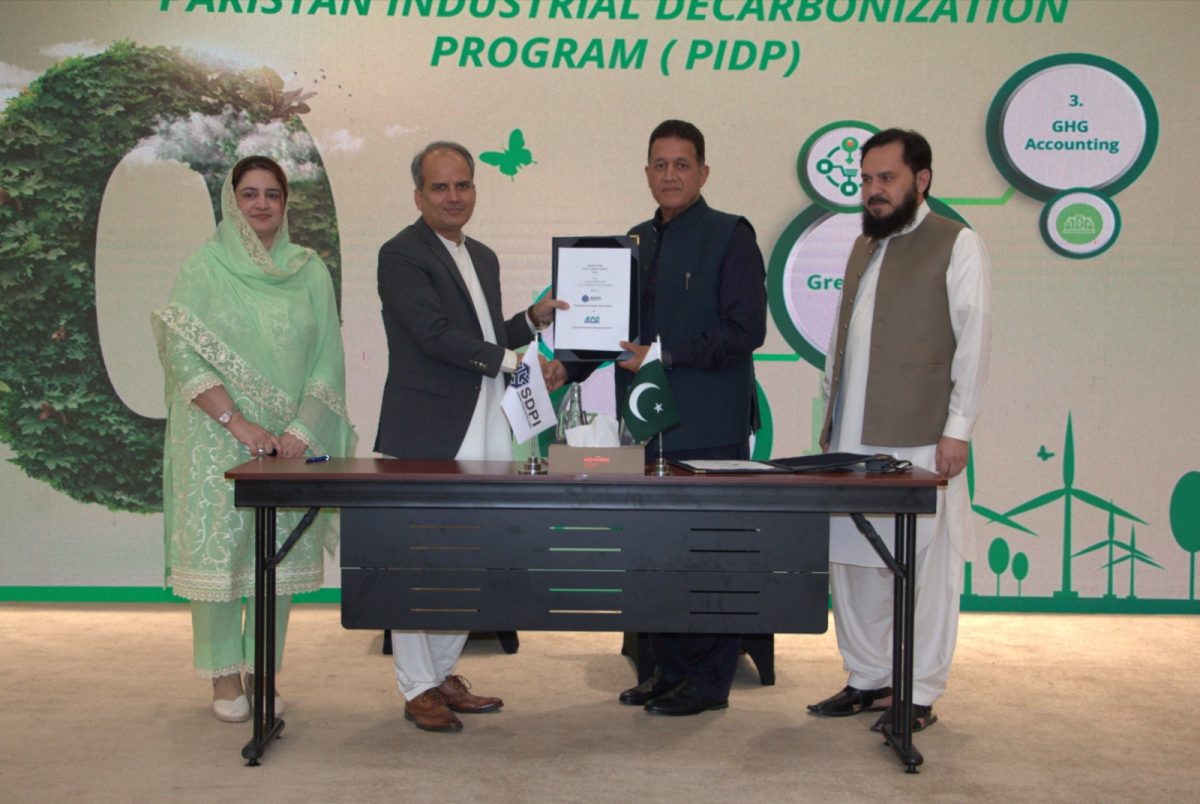
As the haze began to clear over New York City on the afternoon of September 24, Newsweek’s “Pillars of the Green Transition” event kicked off at global headquarters at One World Trade Center. Attendees took in the views as they sipped coffee and snacked on charcuterie, excitedly chatting about the afternoon to come.
The event was sponsored by Arva, Daikin, EcoEngineers, Elopak, LF Bioenergy, Sevana Bioenergy and Wärtsilä.
Programming began precisely at 2:15 p.m. with opening remarks from Newsweek Editor-in-Chief Jennifer Cunningham.
During the first conversation of the day, Newsweek’s Environmental Sustainability and Governance Editor, Jeffery Young, sat down for an intimate chat with Daikin executive vice president Dave Calabrese to discuss “Building a Sustainable Future.” The pair discussed how to create sustainable air conditioning systems, especially in buildings like One World Trade Center, which was built using Daikin air conditioning units.
“We have in this building about 160 units on different floors. It’s all customizable for this building and designed to be incredibly energy-efficient,” Calabrese said. “It’s designed in a way that you can recover heat, and you can remove it from different parts of the building. It’s a huge energy-saving issue.”
These issues are pressing, as global demand for air conditioning is growing, having major impacts on energy consumption worldwide, according to Young.
Newsweek’s Jeffery Young took the stage again for the first official panel of the afternoon, this time with Wärtsilä president and CEO Håkan Agnevall, Electric Power Research Institute (EPRI) program manager Eva Gardow, CEO of Rondo Energy Eric Trusiewicz and Viridi chief sustainability officer Evan van Hook. The conversation, titled “Expanding Possibilities with Energy Storage,” focused on using batteries to manage energy demand and increase efficiency, the use of virtual power plants and the changing energy landscape.
“We have the largest economy in the world running on a D-Plus system that is getting close to the edge,” van Hook said.
The group also discussed the safety of batteries, with Gardow noting that, when lithium batteries were first designed, they were not created with safety in mind, though this issue is becoming more pressing as batteries take on a larger scale. The members of the panel agreed that increased regulations and new technology have, in fact, made batteries safer.
Attendees took a mid-afternoon respite to enjoy a snack of fresh hot pretzels and coffee while mingling with other attendees. This also offered the opportunity to chat with some of the panelists who spoke before the break.
Young remained on stage for the next panel of the day. He sat down with Climate Group CEO Helen Clarkson, HowGood CEO Alex Gillett, Avra chief revenue officer Phil Harris and Elopak CEO Thomas Körmendi to discuss “Growing Climate Solutions in Food Systems,” focusing on sustainability in food production systems and supply chains.
The panelists discussed the risk that comes along with having many different policies both across the United States and around the world.
“You will have a whole host of different regulations between countries and, as we know here, within the country as well,” Körmendi said. “It’s driving cost and it’s injuring innovation. That’s just the fact.”
“The unknown creates risk,” Gillett added. “Having a unified policy is really strong, but you also want one that works towards [converging] pathways.”
The group also discussed how farmers are impacted by sustainability regulations—and the lack thereof.
“We are losing the amount of land that you can grow coffee, that you can grow cacao and so many other crops,” Gillett said.
Clarkson opened up a conversation about the connection between healthy diets and governments, which play a large role.
“There is a lot of evidence that diets that are good for the environment are also good for human health,” Clarkson said. “Acknowledging that it is a long process and, again, this is where governments can kind of be patient.”
Harris commented on the importance of healthy soil, as well, especially for consumers, who he says need to just stick their hands in good soil.
“What I’m hearing is we need to get dirty,” Young quipped.
The final panel of the day—”Turning Emissions Into Energy: Bioenergy at the Core of the Green Transition”—kicked off as Newsweek Senior Editor Katherine Fung led a discussion with Sevana Bioenergy CEO Steve Compton, LF Bioenergy CEO Brent Lilienthal and EcoEngineers President Brad Pleima. The group discussed developing the right products for consumers and not completely abandoning traditional energy solutions in order to transition to more environmentally conscious options.
Pleima brought in an analogy that set the tone for the entire discussion, comparing a Keurig coffee to a Starbucks latte. He noted that, much like renewable natural gas and fossil fuels, the two cannot be compared because they are separate issues, an example that resonated with all the panelists.
“We’ve been trying to build up our relationships, like with the Starbucks analogy, and quantify,” Compton said.
“I didn’t expect to start this panel with an analogy that carried us through the panel,” Pleima laughed.
The panel also discussed drawing investors into such a complicated industry.
Lilienthal said that the best way is to make sure consumers know that these products can help achieve their missions of carbon efficiency.
Event attendees were left with some final remarks as Newsweek’s Jennifer Cunningham and Jeffery Young closed out the speakers for the day. The pair thanked guests and shared five major takeaways from the day: rising energy demand is a paradigm shift, green is not black and white, energy storage opens new possibilities, food systems can swing from carbon source to carbon solution and the importance of maintaining momentum despite headwinds.
The afternoon concluded with a networking reception with views of the skyline. As they reflected on the panels from the day, attendees mingled, enjoyed signature spicy cucumber margaritas and snacked on filet mignon topped with caviar.



